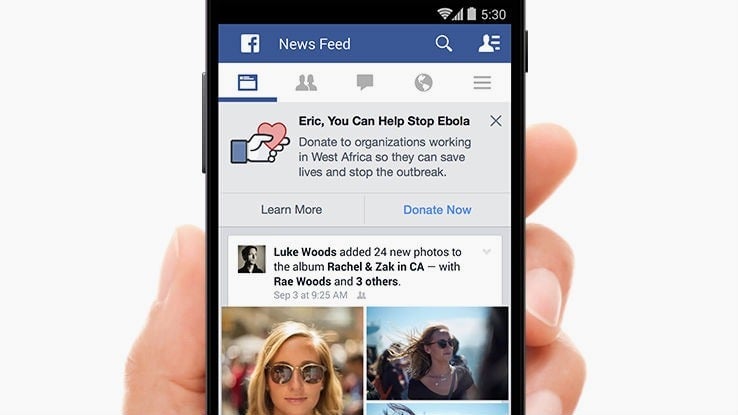Facebook now has a donate button for Ebola
After donating $25 million of his own money to help fight the spread of Ebola, Facebook CEO Mark Zuckerberg now wants 1.3 billion of his closest friends to chip in.


After donating $25 million of his own money to help fight the spread of Ebola, Facebook CEO Mark Zuckerberg now wants 1.3 billion of his closest friends to chip in.
Today, Facebook is installing an Ebola donate button to the top of news feeds, as it did for the Typhoon Haiyan relief effort in 2013. The button will remain on Facebook for about a week. Facebook users will have the option to donate to one of three non-profits: International Medical Corps, the Red Cross, or Save the Children.
The massive press coverage and worldwide concern about the outbreak has not, so far, translated into a huge outpouring of financial help for relief efforts in Africa. To date, the Red Cross has only raised $3.7 million to fight Ebola, while it raised $87 million for the typhoon. With natural disasters, the suddenness of the high death tolls (and images of destroyed buildings) seem to inspire people to donate on the spot. For Ebola, however, the death toll has climbed gradually, which apparently doesn’t provide the jolt necessary for a large influx of donations.
But Ebola has already killed nearly 5,000 people, has infected more than twice as many, and could infect millions more in West Africa over the next year if effective interventions don’t occur quickly.
While Facebook’s strategy to raise money and awareness for Ebola is a nice gesture, that’s all it really is.
The growing sentiment from aid organizations on the ground in West Africa is that what’s really needed is more medical workers. For instance, Canada recently gave another $30.5 million to the Ebola relief effort (on top of the $65 million it had already given), but remained reluctant to send any medical workers to West Africa because of potential issues bringing infected workers back home. Australia isn’t sending workers to West Africa either, for similar reasons.
Jim Yong Kim, the president of the World Bank, says another 5,000 healthcare workers are needed. After the 2010 earthquake in Haiti, hundreds of thousands of aid workers responded to the call. But Ebola, again, is a different animal, in that it poses a risk to any aid worker who travels to West Africa to assist at treatment centers. The prospect of being quarantined upon return, is also causing a chilling effect on medical workers who might otherwise be willing to go to West Africa.
Zuckerberg’s commitment to the relief effort is admirable, but Ebola is a problem that money alone can’t solve.